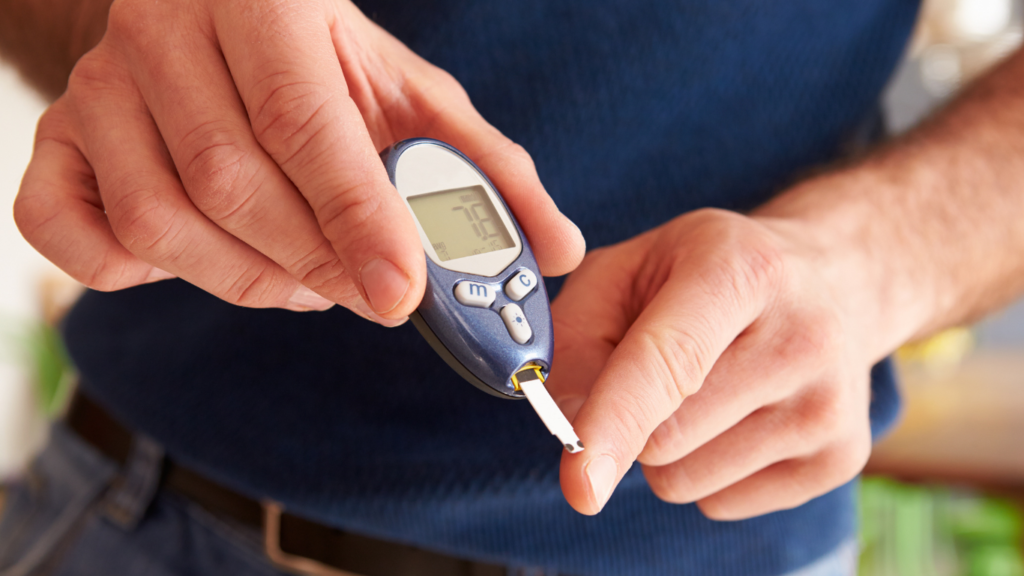
Monsoon brings a sigh of relief from the scorching heat of brutal summer. However, rains with high humidity and fluctuating temperatures can bring their own challenges, especially for diabetic patients. Humid weather during the monsoon can affect insulin sensitivity. Some people may experience lower blood sugar levels, while others might see an increase. The change in season can affect stress levels and hormones, which can lead to fluctuations in blood sugar levels.
When the weather is pleasant, the craving for fried and comfort foods also increases leading to higher consumption of refined carbohydrates and fats. The risk of consuming contaminated water and food increases, which can lead to gastrointestinal infections that can disrupt blood sugar control.
Heavy rains may limit outdoor activities and exercise, leading to decreased physical activity, which is crucial for managing blood sugar levels. Monsoon is a season of increased infections. The humid weather increases the risk of skin infections, particularly for those with diabetes who are prone to foot infections.
The monsoon can increase the risk of respiratory and mosquito-borne illnesses (such as dengue and malaria), which can affect overall health and diabetes management. Continuous rains make the weather gloomy which can affect mood, leading to changes in eating habits and physical activity levels.
Taking care of diabetes during the monsoon season requires special attention. It requires extra attention to diet, exercise, and lifestyle adjustments to cope with the changes in weather and potential health risks.
Here are some strategies to help you maintain stable blood sugar levels during the monsoon:
Dietary Adjustments: A balanced diet with fresh home-cooked meals is important for managing diabetes. The diet should include a variety of nutrient-rich foods that help regulate blood sugar levels and boost immunity. Incorporate whole grains like millet, brown rice, quinoa, and oats instead of refined grains to provide sustained energy and maintain stable blood sugar levels.
Include plenty of fresh, seasonal vegetables such as spinach, gourds, and beans, which are high in fiber and help improve digestion and glycemic control. Lean proteins like fish, chicken, paneer, tofu, and legumes are important for muscle maintenance and should be part of the meal. Healthy fats, such as those found in nuts, seeds, ghee, olive oil support heart health and should be consumed in moderation.
Limit the intake of sugary foods, deep-fried snacks, and high-fat dairy products to avoid blood sugar spikes. Opt for fruits with a low glycemic index, such as apples, pears, and berries, and consume them in controlled portions. You may include some bitter foods like bitter gourd, moringa, and neem.
Hydration: People with diabetes dehydrate more easily than others due to the frequent urination that diabetes causes. Keep drinking safe water throughout the day. You may opt for filtered water to avoid waterborne diseases that can affect blood sugar control. If water quality is particularly bad, opt for RO or boiled water. Stay hydrated to support metabolic processes and maintain optimal health.
Exercise Routine: The rainy season might disrupt our outdoor schedules. Adapt your exercise routine to include indoor activities if outdoor activities are disrupted by rain. Activities like yoga, Pilates, aerobics, dance, and Zumba can be easily done at home. Consistency is extremely important. Try to do exercise on most days of the week to help maintain stable blood sugar levels.
Blood Sugar Monitoring: Frequent blood sugar monitoring is important during monsoon. Check your blood sugar levels more often to detect any fluctuations early. Also, keep a log of your readings to identify patterns and adjust your management plan accordingly.
Foot Care: Foot care is especially important for people with diabetes during the monsoon season due to the increased risk of infections and complications. The humid and damp conditions can lead to fungal infections, which are more difficult for diabetics to heal because of compromised immune function.
Moisture can soften the skin, making it more susceptible to cuts and blisters, while wet shoes and socks can create an ideal environment for bacteria and fungi to thrive. Proper foot care involves keeping feet clean and dry, regularly inspecting for any cuts, blisters, or signs of infection, and wearing moisture-wicking socks and well-fitting footwear. Keep an extra pair of shoes when going out.
By maintaining good foot hygiene and monitoring for any changes, diabetics can prevent minor issues from developing into serious complications, such as ulcers or even gangrene, which could lead to amputations.
Medication Management: Flooding and power outages can sometimes impact the proper storage of medicines. Store medications and insulin in a cool, dry place to maintain their efficacy. Ensure you have a sufficient supply of medications to avoid running out during heavy rains or floods.
Boost Immunity: Incorporate healthy foods rich in vitamins and antioxidants, such as citrus fruits, berries, and leafy greens, to strengthen your immune system. Practice good hygiene and avoid exposure to individuals who are ill to reduce the risk of infections.
Stress Management: Stress can impact sugar levels in many individuals. Gloomy rainy weather can sometimes increase stress and anxiety. Engage in relaxation techniques like deep breathing, meditation, or hobbies to manage stress, which can otherwise affect blood sugar levels. Also ensure that you get enough restful sleep, as sleep deprivation can lead to insulin resistance and elevated blood sugar levels.
Avoid Infections: Avoid going to infection-prone unhygienic places. Practice good hygiene, such as regular hand washing and bathing frequently, to prevent infections. You may use a medicated soap for better infection control. Use mosquito repellents and nets to prevent mosquito-borne diseases like dengue and malaria, which can be more prevalent during the monsoon. Say ‘No’ to street foods during monsoon as there are high chances of contamination. Wash, your fruits and vegetables thoroughly.
Doctor check-ups: Stay in touch with your healthcare provider for regular check-ups and advice to take care. Also, have a plan in place in case of any diabetes-related emergencies during the monsoon like identifying a hospital and whom to call when in emergency.
By following these tips, you can manage your diabetes effectively during the monsoon and reduce the risk of complications.
